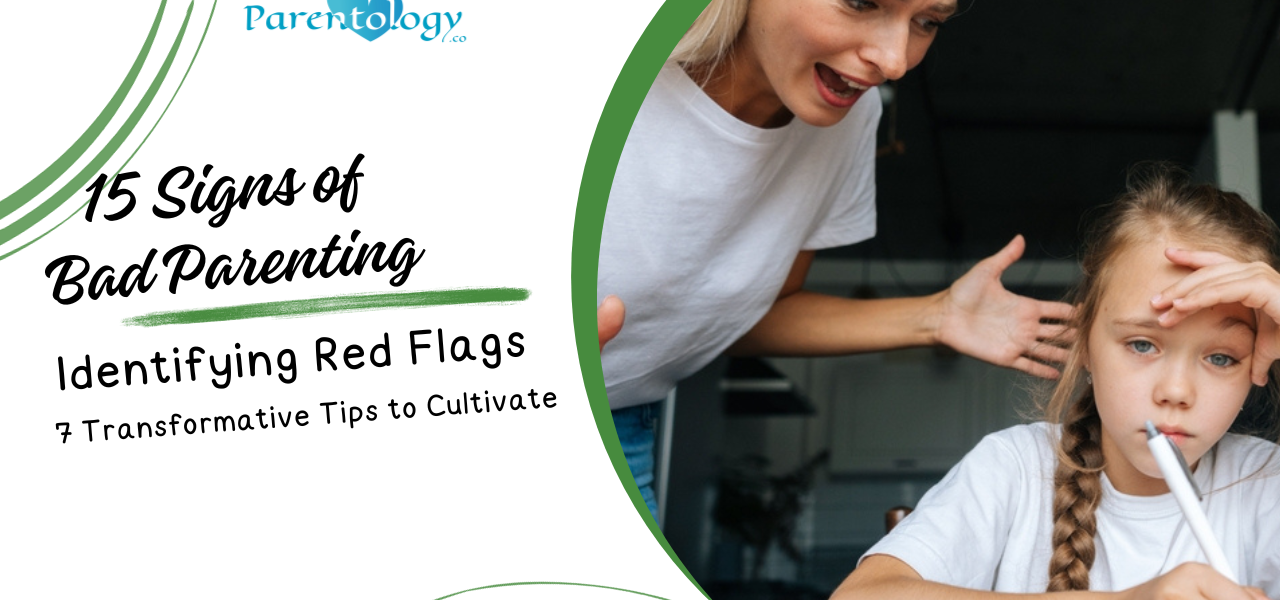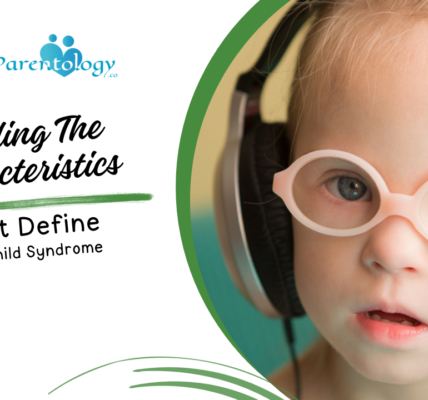15 Signs of Bad Parenting: Identifying Red Flags and 7 Transformative Tips to Cultivate Positive Parenting
Parenting is a profound journey filled with moments of joy, challenges, and invaluable lessons. However, amidst the complexities of raising children, identifying signs of detrimental parenting practices is crucial for fostering a healthy family environment. Understanding the nuances of bad parenting and its impact on children’s development empowers parents to make positive changes in their approach. In this comprehensive guide, we’ll explore 15 telltale signs of bad parenting and unveil seven transformative tips aimed at cultivating positive parenting practices. From inconsistency in discipline to neglecting emotional needs, recognizing these signs is the first step towards nurturing a supportive and nurturing environment. Join us as we delve into this insightful exploration, offering guidance and actionable strategies to pave the way for impactful and enriching parenting experiences.
Signs of Bad Parenting
Parenting styles vary, but certain behaviors might indicate a negative impact on a child’s upbringing. Identifying these signs can initiate a positive shift towards better parenting:
1. Inconsistency in Discipline:
Consistency in discipline is vital for a child’s understanding of boundaries and consequences. When rules are arbitrary or inconsistently enforced, children may become confused or rebel against authority. This inconsistency can hinder a child’s ability to understand right from wrong, leading to behavioral issues. Parents should establish clear rules and consistently apply appropriate consequences, fostering a structured and secure environment for their children’s development.
2. Lack of Empathy:
Empathy is the cornerstone of emotional connection between parents and children. When parents fail to acknowledge or validate their children’s emotions, it can create emotional distance and a lack of trust. Children may feel misunderstood or invalidated, impacting their emotional well-being. Demonstrating empathy involves active listening, understanding, and validating a child’s feelings, nurturing a strong emotional bond between parent and child.


3. Overcontrol or Neglect:
Extreme parenting styles, whether overly controlling or neglectful, can be detrimental to a child’s development. Overly controlling parents may stifle a child’s independence and creativity, while neglectful parents fail to provide the necessary guidance and support. Finding the balance between being present and allowing space for growth is crucial for fostering healthy development in children.
4. Negative Communication:
Constant criticism or negative communication can severely impact a child’s self-esteem and confidence. Children internalize parental feedback, and negative language can shape their self-perception. Encouraging positive communication, offering constructive feedback, and praising efforts can cultivate a supportive environment where children feel valued and empowered.
5. Excessive Pressure for Achievement:
Pressuring children to excel in academic or extracurricular activities beyond their capabilities can lead to stress, anxiety, and burnout. Parents should encourage and support their children’s interests and strengths without imposing unrealistic expectations. Fostering a balanced approach to achievement promotes a healthy attitude towards success and failure.
6. Ignoring Boundaries:
Respecting a child’s boundaries is essential for building trust and autonomy. Disregarding boundaries, whether physical or emotional, can erode trust and lead to feelings of insecurity. Parents should establish clear boundaries and honor their children’s privacy and personal space, nurturing a sense of respect and security within the family dynamic.
7. Failure to Set a Positive Example:
Children learn by observing and imitating their parents’ behaviors and attitudes. Inconsistencies between words and actions can confuse children and diminish the credibility of parental guidance. Setting a positive example through actions aligned with verbal teachings helps instill values and principles in children, shaping their moral compass.
8. Absence of Quality Time:
Quality time spent together fosters stronger bonds and nurtures meaningful connections within the family. A lack of meaningful interactions or bonding activities can lead to feelings of neglect or detachment. Allocating dedicated time for shared activities, conversations, and experiences helps strengthen the parent-child relationship and fosters emotional closeness.
9. Exposure to Toxic Relationships:
Children exposed to conflict, abuse, or unhealthy relationships within the family environment may experience emotional distress and trauma. Creating a safe and supportive environment free from toxicity is crucial for a child’s emotional well-being and healthy development. Parents should strive to model healthy relationships and shield children from harmful dynamics.
10. Ignoring Mental Health Needs:
Neglecting a child’s emotional and mental health needs can have lasting repercussions. Failure to address emotional struggles, anxiety, or depression can impede a child’s overall well-being. Recognizing and addressing mental health concerns through open communication and seeking professional support when needed are vital for supporting a child’s emotional resilience.
11. Inadequate Support System:
A lack of a nurturing and supportive environment can leave children feeling isolated or emotionally unstable. Building a strong support system comprising family, friends, or mentors provides children with a sense of security and belonging. Creating a network of support ensures that children have outlets for guidance and emotional assistance.


12. Indulgence in Substance Abuse:
Parental substance abuse can have profound adverse effects on children’s lives, leading to neglect, instability, and emotional trauma. Children living in households affected by substance abuse may experience disruptions in their daily lives, lack proper care, and suffer from emotional distress. Seeking help and support to address substance abuse issues is crucial for creating a safe and stable environment for children.
13. Rigid Authoritarianism:
An excessively strict or authoritarian parenting style that enforces rules without flexibility can hinder a child’s autonomy and decision-making abilities. Allowing room for negotiation, fostering open communication, and providing guidance without being overly controlling encourages a healthy balance between authority and independence.
14. Avoidance of Responsibilities:
Neglecting parental responsibilities, whether emotional, financial, or educational, can leave children feeling insecure and unattended. Fulfilling parental duties and actively participating in a child’s life is essential for their overall well-being and development.
15. Unwillingness to Seek Help:
Denying or refusing to seek assistance or guidance when facing parenting challenges can impede positive change. Seeking help from professionals, counselors, or support groups can offer valuable insights and strategies for parents to overcome challenges and improve their parenting skills.


Tips to Foster Positive Parenting:
1. Open Communication Channels:
Encouraging open communication establishes trust and allows children to express themselves freely without fear of judgment. Creating a safe space for dialogue fosters healthy parent-child relationships.
2. Consistent and Fair Discipline:
Implementing consistent, fair, and age-appropriate disciplinary actions with clear explanations helps children understand the consequences of their actions.
3. Empathy and Understanding:
Acknowledging and validating a child’s emotions demonstrates empathy, creating a supportive environment where children feel heard and understood.
4. Quality Time and Bonding:
Dedicating quality time for shared activities and meaningful interactions strengthens the parent-child bond and nurtures emotional connections.
5. Encourage Independence:
Supporting a child’s autonomy within safe boundaries encourages decision-making skills and fosters self-confidence.
6. Lead by Example:
Being a role model by demonstrating positive behaviors and values reinforces the lessons parents impart to their children.
7. Seek Professional Help When Necessary:
Recognizing when external guidance or counseling is needed and seeking assistance promotes growth and positive change in parenting approaches.
FAQs about Bad Parenting:
1. How can I improve my parenting skills if I recognize these signs?
Recognizing the signs of bad parenting is the first step towards improvement. Consider seeking guidance from parenting books, attending parenting workshops, or seeking professional counseling to develop healthier parenting strategies tailored to your family’s needs.
2. What are some long-term effects of bad parenting on children?
Children exposed to bad parenting practices may experience long-term effects such as low self-esteem, behavioral issues, difficulty forming relationships, anxiety, depression, and a lack of trust in authority figures.
3. Can bad parenting habits be unlearned or changed over time?
Yes, bad parenting habits can be unlearned and replaced with healthier alternatives through self-reflection, willingness to change, seeking support, and implementing consistent efforts to improve parenting approaches.
4. Is it common for parents to exhibit some of these signs unknowingly?
Yes, many parents may exhibit certain signs of bad parenting unknowingly. Being aware of these signs and actively seeking ways to improve parenting skills can contribute to positive changes in their approach.
5. How do I strike a balance between being too strict and too lenient?
Finding a balance involves understanding your child’s needs, setting clear and reasonable boundaries, providing guidance, and being flexible when necessary. Consistent communication and reassessment of parenting approaches contribute to striking a healthy balance.
6. Are there community resources available to support parents in improving their parenting skills?
Yes, there are various community resources such as parenting support groups, online forums, local parenting workshops, and counseling services that offer guidance and support to parents seeking to enhance their parenting skills.
7. Can bad parenting affect a child’s mental health?
Yes, bad parenting practices can significantly impact a child’s mental health, potentially leading to emotional distress, anxiety, depression, and other psychological issues that may persist into adulthood.
8. What role does parental self-care play in positive parenting?
Prioritizing parental self-care is crucial. When parents take care of their physical, mental, and emotional well-being, they can better handle parenting challenges, exhibit patience, and provide a nurturing environment for their children.
9. Are there specific strategies for dealing with challenging behaviors in children?
Understanding the root cause of challenging behaviors, implementing positive reinforcement techniques, setting clear expectations, and maintaining consistency in discipline can effectively address challenging behaviors in children.
10. How can parents ensure they maintain a healthy relationship with their children as they grow older?
Maintaining open communication, respecting their independence while offering guidance, showing interest in their lives, and adapting parenting styles to their evolving needs can foster a healthy parent-child relationship as they grow older.
Conclusion:
Recognizing the signs of bad parenting and implementing strategies for positive change are pivotal for fostering a healthy and nurturing environment for children’s growth and development. By addressing these signs and incorporating transformative tips, parents can enhance their parenting skills, strengthen family relationships, and provide a supportive atmosphere for their children’s well-being.
Remember, parenting is an ongoing journey of learning and adapting. Seeking support, being open to change, and prioritizing the well-being of both parents and children contribute to a fulfilling and positive parenting experience.
For a comprehensive guide on effective parenting strategies and further insights, explore more on Parentology. Their resources can aid in nurturing positive parenting approaches and strengthening family dynamics.





